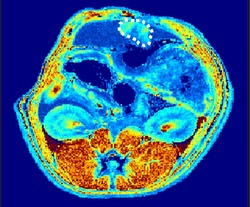At the Society of Interventional Radiology Annual Scientific Meeting in mid-April, third-year medical students Alexander Sheu and Patrick Tyler both received the Dr. Constantin Cope Medical Student Research Award. This award recognizes student scientists interested in pursuing careers in interventional radiology (IR).
Sheu’s abstract – “Transcatheter Intra-Arterial Delivery of Superparamagnetic Iron Oxide-Labeled Natural Killer Lymphocytes to Hepatocellular Carcinoma: Longitudinal Efficacy Studies in a Rat Model” – was named a distinguished abstract at the meeting. Sheu also recently received a Radiological Society of North America Research and Education Foundation research medical student grant.
Tyler also received the award for his abstract, “High-Field MRI Accurately Quantifies Tumor Uptake of Therapeutic Iron-Oxide Nanoparticles in the Mca-R7777 Rat Model of Liver Cancer.”
Both took a year off to work on liver cancer research projects that focused on delivering less invasive and less toxic therapies.
Tyler’s research uses imaging to measure exactly how much chemotherapy was given to treat a tumor. He used a nanoparticle agent, which serves as an image tracer, attached to molecules of a chemotherapy drug. Through MRI scans, Tyler could measure the quantity of drug delivered to the tumor.
“The hope is to one day deliver precisely the right quantity of drugs without delivering so much that the patient suffers from systemic side effects. The goal is to concentrate the drug at the site of the tumor and deliver less to healthy tissues” he said.
Sheu’s research focuses on adoptive immunotherapy, where he uses the body’s own immune system to treat cancer. Using a similar mechanism as Tyler, Sheu delivers a type of white blood cell to the body and uses MRI technology to track where the cells are going.

“I’m using natural killer cells, a type of white blood cell,” said Sheu, a Howard Hughes Medical Institute Medical Research Fellow. “The body actually already makes these cells to fight virus-infected cells and cancer cells, but in this case, we are giving the body more to help eradicate the tumor cells. Why reinvent the wheel?”
Because of these research experiences, Sheu and Tyler decided to found the IR interest group. Started this past fall, the group exposes students to the field early on in their medical school careers. Initiatives include hosting educational talks, promoting research opportunities within the IR department, connecting students with faculty and mentors, and offering shadowing experiences. They have recruited three second years, Katherine Teter, Aditya Kanesa-thasan, and Elijah Burton, to serve as the group’s three co-leaders.
“You don’t have to be interested in specializing in IR to join the group. You can be interested in cancer, in surgery, in a lot of different things, and a research project in this area may appeal to you.” said Tyler. “Skills learned through this group can be applied to any area of medicine, such as how to develop a project from an idea, use a sophisticated piece of equipment, work with other people, and how to write and present.”
For more information on the Interventional Radiology Interest Group, please contact Alexander Sheu or Patrick Tyler.






